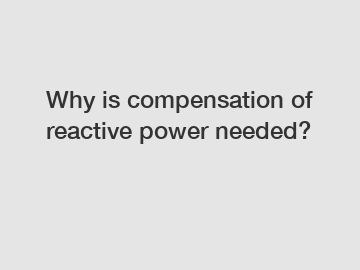Jan. 13, 2024
Electrical Equipment
Why is compensation of reactive power needed?
Reactive power compensation is an essential aspect of power systems. In simple terms, reactive power refers to the power consumed by certain elements in a circuit that do not contribute to the actual work done. These elements include inductive loads such as motors, transformers, and generators, as well as capacitive loads like capacitors. While reactive power does not perform any useful work, it is necessary for the basic functioning of electrical systems. Therefore, compensating for reactive power is crucial to maintain the overall efficiency and reliability of power distribution.
The need for reactive power compensation arises from the fact that reactive power causes a range of undesirable effects in power systems. Firstly, it reduces the overall power factor of the system. The power factor indicates the efficiency of power usage in a system. A low power factor means that a significant amount of power is wasted as reactive power, leading to increased energy consumption. By compensating for reactive power, the power factor can be improved, resulting in reduced energy losses and higher system efficiency.

Furthermore, reactive power compensation helps to mitigate voltage drops or fluctuations. When there is a high demand for reactive power due to inductive loads, the voltage at the transmission and distribution lines tends to decrease. This can lead to voltage drops, inadequate voltage supply to consumers, and potential equipment failures. Compensating for reactive power ensures a stable voltage supply, thereby improving the reliability of the power system and preventing damage to sensitive electrical appliances.
The process of reactive power compensation involves the installation of power factor correction equipment, such as capacitors and inductors, at strategic locations within the power grid. These compensation devices generate reactive power that offsets the reactive power consumption of inductive loads. By injecting reactive power into the system, the compensation equipment helps to minimize the wastage of energy and maintain a higher power factor.
The significance of reactive power compensation extends beyond just improving energy efficiency. It also has a positive economic impact by reducing electricity bills for industrial consumers. Many utility companies employ reactive power charges as part of their billing structure to penalize consumers with poor power factors. By compensating for reactive power, industrial consumers can avoid these penalties and achieve significant cost savings.
In conclusion, the compensation of reactive power is necessary to optimize the efficiency and reliability of power systems. It helps to improve the power factor, reduce energy losses, mitigate voltage drops, and avoid penalties for poor power factor. Through the installation of compensation equipment, power systems can maintain a stable voltage supply and enhance overall system performance. Therefore, proactive reactive power management is essential for ensuring a sustainable and economically viable electrical grid.
The company is the world’s best ring main unit, sf6 gas insulated switchgear, fixed-mounted switchgear factory supplier. We are your one-stop shop for all needs. Our staff are highly-specialized and will help you find the product you need.
Previous: Should I use OPGW or ADSS?
Next: Which Kuwait automobile battery store offers the smartest sustainability solutions?
If you are interested in sending in a Guest Blogger Submission,welcome to write for us!
All Comments ( 0 )